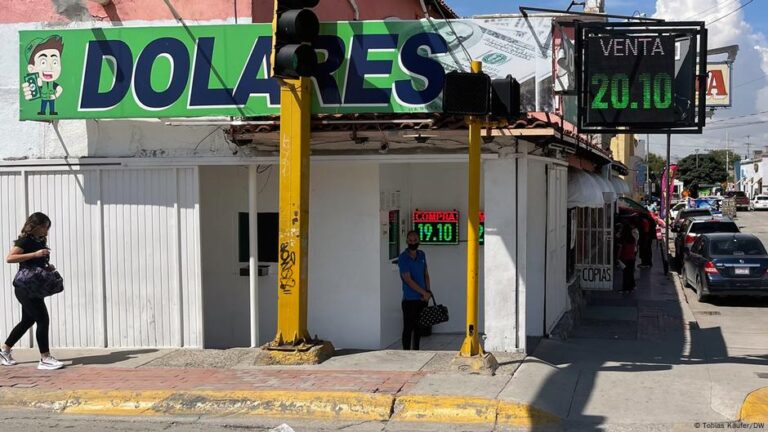Mexico’s President Claudia Sheinbaum chose a symbolic stage for shooting back at US President Donald Trump’s proposal for taxing remittances, called “remesas” in Spanish-speaking Latin America.
During the construction ceremony for the Los Cabos Regional General Hospital in Baja California Sur on Sunday (May 18), she stressed that the US “can’t tax people twice when they’re already paying taxes.”
By choosing this setting, Sheinbaum visually reinforced the social and political dimension of the US regulation, which is causing widespread concern across the entire region.
Republican lawmakers have included the plan for a 5% tax on remittance transfers in Donald Trump’s so-called One, Big, Beautiful Bill, a sweeping multi-trillion-dollar piece of legislation aimed at advancing Trump’s agenda on taxes, migration, energy, defense and the national debt.
Bill targets $160 billion in annual transfers
According to the annual report from the Migration Department of the Inter-American Development Bank, remittances from the US to Latin America and the Caribbean reached $160.9 billion (€142.53 billion) in 2024 — an increase of $7.7 billion over the previous year.
The largest recipients were Mexico ($64.7 billion) and Guatemala ($21.5 billion). Transfers to Mexico alone average about $177 million per day.
Jesus Alejandro Cervantes Gonzalez from the Center for Latin American Monetary Studies (CEMLA) in Mexico City has broken down the 2024 figures in an interview with DW. He said remittances make up “20% of GDP in Guatemala, 27% in Nicaragua, 26% in Honduras, 24% in El Salvador, 20% in Haiti, and 19% in Jamaica.”
The economic and social significance of these funds for the receiving countries is immense, he said, as they “alleviate financial constraints for millions of households and reduce poverty.”
“They enable a higher standard of living and help fund spending on consumer goods, education, health, housing, and sometimes investments in small family businesses,” he said.
According to CEMLA, which specializes in the economics of remittances, about 4.5 million households and 9.8 million adults in Mexico receive such transfers from the US, with poorer rural areas benefiting the most.
Taxation and identity checks aim at curbing illegal migration
According to leading Spanish economic and financial news portal El Economista, based in Madrid, Florida Governor Ron DeSantis is reportedly considering requiring identity verification for money transfers, meaning senders would have to prove they are legally employed in the US.
The measure, intended to block remittances from undocumented migrants, has been criticized by Mexican Senator Antonino Morales from the ruling Morena party as “blatantly discriminatory and racist.”
Morales also said beyond the remittance tax, undocumented migrants could also “lose access to [health care] programs like Obamacare and Medicare.”
Risk of diverted remittance flows
“In principle, the tax would only apply to immigrants who are not US citizens. That includes undocumented migrants as well as those who are legally residing in the country,” CEMLA expert Gonzalez told DW.
If implemented in 2026 as proposed, the remittance tax could significantly reduce the flow of money from the US to Latin America and the Caribbean.
For countries such as Mexico, Guatemala, Honduras, El Salvador, and Nicaragua —where remittances account for a high share of GDP — the impact would be especially severe.
Gonzales says that these countries would face a double blow as the tax would be imposed “in addition to ongoing deportations of undocumented immigrants,” and comes at a time when there are “signs that employment among Latin American immigrants in the US is declining.”
He also warns of unintended consequences. “The remittance tax could push transfers into informal channels — through couriers or digital cryptocurrency transactions,” which could raise the risk of black market activity.
Trump’s Republicans risk alienating Latino voters
But the backlash may already be taking shape. Harsh images of Latin American migrants being arrested in the US and the steady stream of negative news affecting Hispanic Americans have intensified pressure on Republican politicians ahead of the November 2026 midterm elections. These elections will decide all seats in the House of Representatives and one-third of the Senate.
In the 2024 presidential election, a significant number of Latinos voted for Republicans and Donald Trump — more than in the previous 2020 election. But some Latino voters, particularly in Republican strongholds like Florida, now feel betrayed by the party.
President Sheinbaum has explicitly called on Mexican Americans to voice their concerns to local US politicians. The Republican-controlled House of Representatives on Thursday passed the tax cut and spending bill by a narrow margin. The bill will now move to the Senate for a vote before President Trump can sign it into law.
This article was originally written in German.


